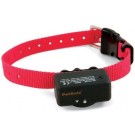
Please visit and LIKE / FOLLOW our Facebook Page and share with family, friends and on your own Facebook page, and ask them to share further – it is only by working together and sharing knowledge and education that we can improve the lives of dogs and assist owners. We do not inundate you with posts – an average of 5 per week, plus one Tip of the Week, and the odd informative post. Thank You!

As a dog behaviorist for over 20 years I've seen 'quick fix' methods come and go. But typically these devices, such as bark collars, are only treating the symptoms and do nothing to address the cause of the behavior. Barking, as is the case with most 'bad' behaviors, is merely a by-product of a bigger issue. If the root cause of a problem isn't addressed the behavior is sure to continue.
There are a lot of reasons why a dog barks and some of them are perfectly good ones. If the dog is barking at an external stimulus, it will be more effective in the long run to familiarize the dog with the thing it is barking at. If it's barking is from fear, stress or anxiety a bark collar, whether it is a shock or citronella collar, will only make the situation worse. The reason being is that the dog is receiving negative reinforcement at the exact moment it is stressed. More stress equals more fear or anxiety and the cycle continues. Even if the e-collar made the barking stop, it is highly likely that it will create an entirely new and probably worse problem, the most common is self mutilation. A better result is attained by teaching the dog to be comfortable in a given situation where it doesn't feel the need to bark. But for that to take place it's essential to determine why the dog is barking in the first place.
I am strongly opposed to electronic collars on dogs, because I have always been able to solve problems without them. I would never suggest to one of my clients that they shock their dog or spray them in the face with a noxious substance. The only type of electronic collar that I feel is of benefit is a vibrating collar for a deaf dog. This is a way to communicate with the dog if it can't hear you. It's sort of a 'gentle tap' to get the dogs attention. Other than that, I believe praise-based, consistent training is a much more effective training method when compared to electronic collars.
As an adjunct to this devocalizing is another quick fix that just doesn't make sense. We shouldn't just chop up a dogs vocal chords any quicker than we should use a shock collar to st them from barking. Dogs should be trained to be comfortable in their surroundings. My hope is to guide people to help accustom dogs to things and not punish them for exhibiting annoying symptoms. Look at the cause and then work to remove that and you will have a long lasting and humane solution.
Expert Dog Behaviorist Jonathan Klein has successfully trained more than 8,000 dogs and their owners over his 20-year career. Jonathan Klein posts tips on training and answers questions on his website: http://www.thedogbehaviorexpert.com/
He is the founder of the West Los Angeles-based, "I Said Sit!" School for Dogs http://isaidsit.com which was voted #1 Dog Training School in Los Angeles for 2009-2011 by the LA Hotlist. Jonathan was one of the first trainers to pursue the "causative" approach to training, which moves past correcting the symptoms of bad behavior and instead focuses on removing the cause, to successfully address behavior problems without breaking the spirit of the dog.
Jonathan holds numerous professional association memberships, and has given hundreds of presentations on dogs, training, and responsible ownership...all from a place of praise-based training methods.
There are a lot of reasons why a dog barks and some of them are perfectly good ones. If the dog is barking at an external stimulus, it will be more effective in the long run to familiarize the dog with the thing it is barking at. If it's barking is from fear, stress or anxiety a bark collar, whether it is a shock or citronella collar, will only make the situation worse. The reason being is that the dog is receiving negative reinforcement at the exact moment it is stressed. More stress equals more fear or anxiety and the cycle continues. Even if the e-collar made the barking stop, it is highly likely that it will create an entirely new and probably worse problem, the most common is self mutilation. A better result is attained by teaching the dog to be comfortable in a given situation where it doesn't feel the need to bark. But for that to take place it's essential to determine why the dog is barking in the first place.
I am strongly opposed to electronic collars on dogs, because I have always been able to solve problems without them. I would never suggest to one of my clients that they shock their dog or spray them in the face with a noxious substance. The only type of electronic collar that I feel is of benefit is a vibrating collar for a deaf dog. This is a way to communicate with the dog if it can't hear you. It's sort of a 'gentle tap' to get the dogs attention. Other than that, I believe praise-based, consistent training is a much more effective training method when compared to electronic collars.
As an adjunct to this devocalizing is another quick fix that just doesn't make sense. We shouldn't just chop up a dogs vocal chords any quicker than we should use a shock collar to st them from barking. Dogs should be trained to be comfortable in their surroundings. My hope is to guide people to help accustom dogs to things and not punish them for exhibiting annoying symptoms. Look at the cause and then work to remove that and you will have a long lasting and humane solution.
Expert Dog Behaviorist Jonathan Klein has successfully trained more than 8,000 dogs and their owners over his 20-year career. Jonathan Klein posts tips on training and answers questions on his website: http://www.thedogbehaviorexpert.com/
He is the founder of the West Los Angeles-based, "I Said Sit!" School for Dogs http://isaidsit.com which was voted #1 Dog Training School in Los Angeles for 2009-2011 by the LA Hotlist. Jonathan was one of the first trainers to pursue the "causative" approach to training, which moves past correcting the symptoms of bad behavior and instead focuses on removing the cause, to successfully address behavior problems without breaking the spirit of the dog.
Jonathan holds numerous professional association memberships, and has given hundreds of presentations on dogs, training, and responsible ownership...all from a place of praise-based training methods.




